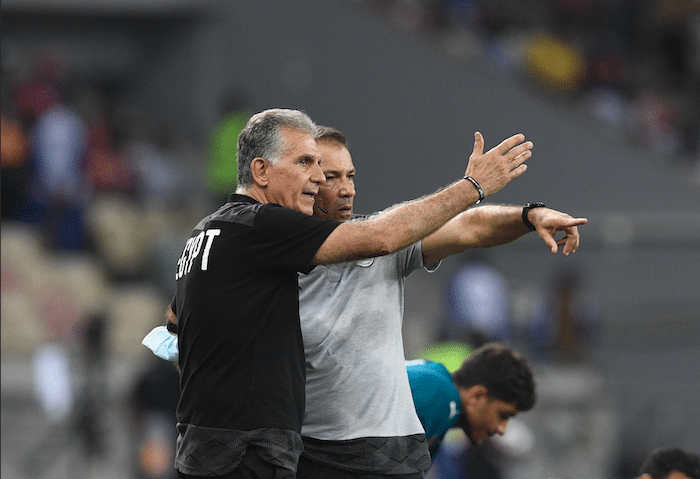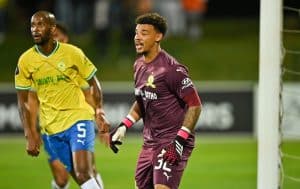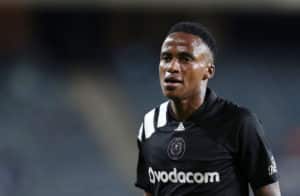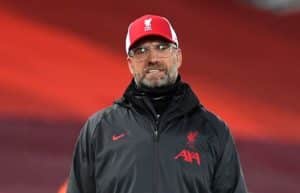Roger De Sa has been the right-hand man to Portuguese coach Carlos Queiroz at several national teams, writes Mogamad Allie.
The disappointment of missing out on a trial with Portuguese side Sporting Lisbon in 1997 is quickly
forgotten when Roger de Sá recalls the doors that would subsequently be opened to the big and unforgettable international coaching gigs that were to follow.
A telephone conversation – in Portuguese – with Carlos Queiroz, who was coach of Sporting Lisbon at the time, laid the foundations for the former Bafana Bafana goalkeeper to be part of Queiroz’s technical teams at the 2010 and 2022 World Cups, as well as the 2022 Africa Cup of Nations.
“Our paths first crossed when Sporting wanted me to come over to Lisbon for a trial but Mamelodi Sundowns, my club at the time, wouldn’t allow me to go,” De Sá tells SoccerClub.
But as fate would have it, Queiroz sought out De Sá when the Portuguese coach was appointed Bafana boss in August 2000.
“Soon after Carlos arrived in South Africa he called me to arrange a meeting to discuss the team, the players and
to get general information about the football setup here. After I informed him that I would no longer be playing for the national team he asked me to help with the goalkeepers and take it from there,” De Sá says.
He would continue his association with Queiroz after the Mozambique- born coach quit the Bafana job shortly before the 2002 World Cup, when Jomo Sono was appointed technical director by Safa.
“When Carlos moved to Manchester United to take up the position as assistant to manager Alex Ferguson in June 2002, I got to work as the club’s African scout going to the different CAF tournaments to look at players.
“After that we linked up again when he asked me to work with Portugal’s national team at the 2010 World Cup here in South Africa. Although I was an assistant, I had different duties like organising the training on the days the players were resting, bringing in local players to help make up numbers for the training – I would get the
Wits juniors for that purpose.
“Having somebody with local knowledge and contacts was useful to the Portuguese team. I was also assigned to analyse other teams so I watched quite a lot of the opposition. Those were the early days and I certainly was not as involved as I became later,” says the former Bafana goalkeeper.
“Working with him over the years, the workload is heavier as he’s aged but he’s still in top condition at 71 and he’s a very energetic man, so he doesn’t pass on too many of his own responsibilities to others,” he adds.
De Sá missed out on the opportunity of working again with Queiroz, who was in charge of Iran at the 2014 World Cup in Brazil, opting instead to focus on his club coaching career in South Africa.
Having led Bidvest Wits to the Nedbank Cup crown in 2010, he also guided Orlando Pirates to the final of the 2013 African Champions League, as well as winning the MTN8 with Ajax Cape Town in 2015.
That success came just a few months after finishing runners-up to Mamelodi Sundowns in the Nedbank Cup at the conclusion of the previous campaign.
Still, the pair kept in touch and Queiroz summoned the former Moroka Swallows and Sundowns goalkeeper once again when he was appointed coach of Egypt in September 2021. “He contacted me saying he needed African experience and knowledge, so we started again,” says De Sá.
The Pharaohs came close to ending a 12-year title drought when they went all the way to the final in February 2022, only to lose on penalties to Senegal, who claimed their first ever Nations Cup title.
The spell with Egypt would last only eight months after the seven- time African champions lost again to Senegal, this time a month later when they failed to qualify for the 2022 World Cup in Qatar.
But before taking the Egypt job, the former Real Madrid coach could well have had a second stint as the Bafana coach, having been strongly in the running before Hugo Broos was appointed in May 2021.
“After returning from his job with Mexico, Carlos was on holiday in Mozambique when he called me to say Bafana had contacted him,” says De Sá. “He seemed convinced he would take the job but then missed the crucial last meeting because he was hospitalised due to illness. It was touch and go between him and Broos.”
After missing the boat to FIFA’s showpiece event with Egypt, Queiroz still made it to Qatar when he answered the call to return to Iran, whom he had coached at the 2014 and 2018 World Cups. He took over from Croatian Dragan Skočić a mere two months before the start of the tournament.
Queiroz called on De Sá to join him as assistant coach at Team Melli. “Carlos likes to brag that he employs a head coach. He likes to say, ‘Roger is a head coach, not an assistant coach!’ and he’s right … I’ve never been an assistant coach to anyone else in the world.
“My first day as coach at Wits I was the head coach even when I was player/coach.
“I’ve only ever assisted Carlos. He likes me to think and participate like a head coach – to pass on my knowledge and opinion as a head coach.
“He appreciates that. We have a similar work ethic. Sometimes we have different views of the game, which
is important, but in many ways we are similar.”
Needless to say, working in different countries with some of the game’s top players has brought with it a lifetime filled with unforgettable experiences. At the same time it has also allowed De Sá to cultivate special friendships that extend beyond football.
“Those experiences could be on the training ground, the video room, on an aeroplane, in the bus, anywhere. I’ve come across some fantastic footballers and great people. My experience of living in Iran and coaching the national team was a fantastic experience. The same with Egypt. Living in great cities like Tehran and Cairo is something that I treasure.
“What an honour it’s been to work with some superstars – the bigger the name, the nicer the person. Mo Salah, for me, is an even better man than he is a player. He’s still in touch with me, as is Mohamed Elneny.
“The same with the Iranian players – Mehdi Taremi, who’s a star at Porto and Alireza Jahanbakhsh, who’s with Feyenoord – they are all super human beings in addition to being super athletes and footballers. Qatar also has its own stars.
“Those are the things I take with me: friendships we’ve developed along the way. Sometimes people outside football – the hotel manager, a waiter at a coffee bar or the kit man in Iran, for example.”
Interestingly, De Sá reveals that he has not developed too close a personal friendship with Queiroz despite their long association. “It’s not as strong as people think. It’s a working relationship so you to try and keep that pretty disciplined and professional.
“Carlos, being the professional he is, doesn’t allow too much proximity from his colleagues. You have to respect that because the fact that he kept coming back for me is entirely because of my professional approach. He’s never been to my house, and I’ve never been to his.
“I think it’s like that with all the other staff that we’ve worked with. It’s about 10 guys that ultimately I look after. We chop and change as we change countries and also depending on availability. It’s a tight-knit work force. We do spend time together and we have developed a bond but it’s a professional relationship.
“Of course, we communicate. I do, for example, know he’s gone for a knee operation in the United States, but don’t ask me which knee!”
After their premature departure from the Qatar national team in December just ten months into what was intended to be a four-year contract, De Sá, who turns 60 in October, is happy to bide his time at home in Cape Town before contemplating his next move.
“I’m not desperate but I’d like to work. I’m looking for a project that will excite and motivate me. At the moment I’m doing alterations at my house, playing golf and watching the NBA on TV. I also watch a bit of the PSL.
“Chances are that by July I will be back at work; whether it’s here or elsewhere, I don’t know. I’ve had little bites from national teams and clubs all over, but I’m not in a rush.
“After all the experience I’ve gained from working with five different national teams and at international tournaments, I can be a little choosy about which challenge I’m up for.”
Photo by Sydney Mahlangu/BackpagePix





